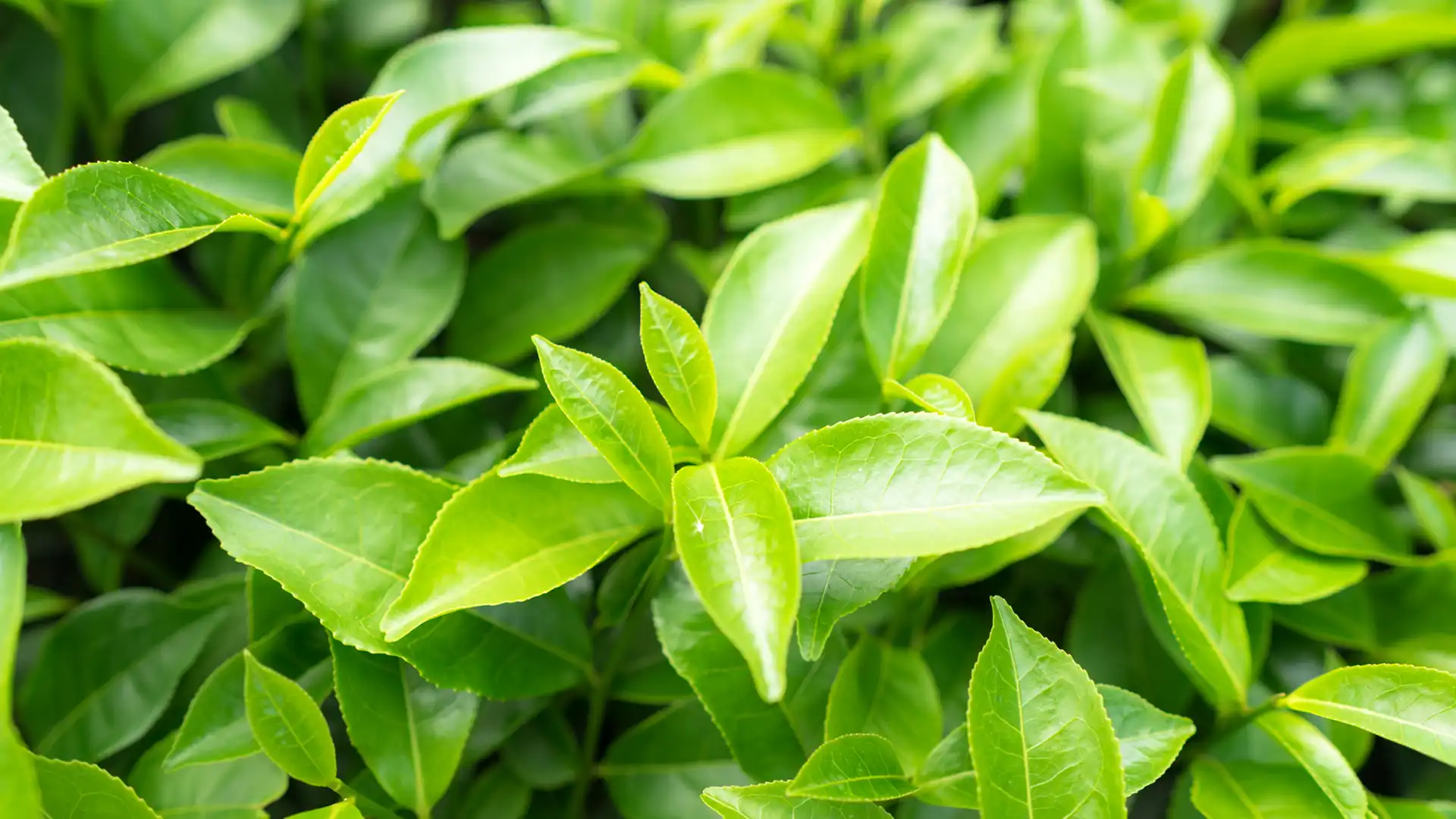
What Is The Amino Acid L-Theanine?
L-theanine is a naturally occurring amino acid primarily found in tea leaves, especially green tea. It’s known for its calming and relaxing effects, often used to promote relaxation without inducing drowsiness.
L-theanine is believed to work by increasing levels of certain neurotransmitters in the brain, including GABA (gamma-aminobutyric acid), dopamine, and serotonin. These neurotransmitters play key roles in regulating mood, attention, and stress response.
Why do you see L-theanine in combination with caffeine?
L-theanine is often used in combination with caffeine to try and mitigate some of the negative side effects of caffeine such as jitteriness and anxiety, while still enhancing focus and attention.
What are some potential downsides of taking L-theanine?
- Drowsiness: Taking too much L-theanine in a single dosage may cause drowsiness even alongside caffeine supplementation.
- Individual tolerance: While most people tolerate L-theanine well, individual responses may vary. Some individuals may be more sensitive to its effects or may not experience the desired benefits. It’s important to start with a low dose and monitor your response to determine the optimal dose for you.
L-theanine is a naturally occurring amino acid primarily found in tea leaves, especially green tea. It’s known for its calming and relaxing effects, often used to promote relaxation without inducing drowsiness.
L-theanine is believed to work by increasing levels of certain neurotransmitters in the brain, including GABA (gamma-aminobutyric acid), dopamine, and serotonin. These neurotransmitters play key roles in regulating mood, attention, and stress response.
Why do you see L-theanine in combination with caffeine?
L-theanine is often used in combination with caffeine to try and mitigate some of the negative side effects of caffeine such as jitteriness and anxiety, while still enhancing focus and attention.
What are some potential downsides of taking L-theanine?
- Drowsiness: Taking too much L-theanine in a single dosage may cause drowsiness even alongside caffeine supplementation.
- Individual tolerance: While most people tolerate L-theanine well, individual responses may vary. Some individuals may be more sensitive to its effects or may not experience the desired benefits. It’s important to start with a low dose and monitor your response to determine the optimal dose for you.
L-theanine is a naturally occurring amino acid primarily found in tea leaves, especially green tea. It’s known for its calming and relaxing effects, often used to promote relaxation without inducing drowsiness.
L-theanine is believed to work by increasing levels of certain neurotransmitters in the brain, including GABA (gamma-aminobutyric acid), dopamine, and serotonin. These neurotransmitters play key roles in regulating mood, attention, and stress response.
Why do you see L-theanine in combination with caffeine?
L-theanine is often used in combination with caffeine to try and mitigate some of the negative side effects of caffeine such as jitteriness and anxiety, while still enhancing focus and attention.
What are some potential downsides of taking L-theanine?
- Drowsiness: Taking too much L-theanine in a single dosage may cause drowsiness even alongside caffeine supplementation.
- Individual tolerance: While most people tolerate L-theanine well, individual responses may vary. Some individuals may be more sensitive to its effects or may not experience the desired benefits. It’s important to start with a low dose and monitor your response to determine the optimal dose for you.

What Is The Amino Acid L-Theanine?
L-theanine is a naturally occurring amino acid primarily found in tea leaves, especially green tea. It’s known for its calming and relaxing effects, often used to promote relaxation without inducing drowsiness.
L-theanine is believed to work by increasing levels of certain neurotransmitters in the brain, including GABA (gamma-aminobutyric acid), dopamine, and serotonin. These neurotransmitters play key roles in regulating mood, attention, and stress response.
Why do you see L-theanine in combination with caffeine?
L-theanine is often used in combination with caffeine to try and mitigate some of the negative side effects of caffeine such as jitteriness and anxiety, while still enhancing focus and attention.
What are some potential downsides of taking L-theanine?
- Drowsiness: Taking too much L-theanine in a single dosage may cause drowsiness even alongside caffeine supplementation.
- Individual tolerance: While most people tolerate L-theanine well, individual responses may vary. Some individuals may be more sensitive to its effects or may not experience the desired benefits. It’s important to start with a low dose and monitor your response to determine the optimal dose for you.
L-theanine is a naturally occurring amino acid primarily found in tea leaves, especially green tea. It’s known for its calming and relaxing effects, often used to promote relaxation without inducing drowsiness.
L-theanine is believed to work by increasing levels of certain neurotransmitters in the brain, including GABA (gamma-aminobutyric acid), dopamine, and serotonin. These neurotransmitters play key roles in regulating mood, attention, and stress response.
Why do you see L-theanine in combination with caffeine?
L-theanine is often used in combination with caffeine to try and mitigate some of the negative side effects of caffeine such as jitteriness and anxiety, while still enhancing focus and attention.
What are some potential downsides of taking L-theanine?
- Drowsiness: Taking too much L-theanine in a single dosage may cause drowsiness even alongside caffeine supplementation.
- Individual tolerance: While most people tolerate L-theanine well, individual responses may vary. Some individuals may be more sensitive to its effects or may not experience the desired benefits. It’s important to start with a low dose and monitor your response to determine the optimal dose for you.
L-theanine is a naturally occurring amino acid primarily found in tea leaves, especially green tea. It’s known for its calming and relaxing effects, often used to promote relaxation without inducing drowsiness.
L-theanine is believed to work by increasing levels of certain neurotransmitters in the brain, including GABA (gamma-aminobutyric acid), dopamine, and serotonin. These neurotransmitters play key roles in regulating mood, attention, and stress response.
Why do you see L-theanine in combination with caffeine?
L-theanine is often used in combination with caffeine to try and mitigate some of the negative side effects of caffeine such as jitteriness and anxiety, while still enhancing focus and attention.
What are some potential downsides of taking L-theanine?
- Drowsiness: Taking too much L-theanine in a single dosage may cause drowsiness even alongside caffeine supplementation.
- Individual tolerance: While most people tolerate L-theanine well, individual responses may vary. Some individuals may be more sensitive to its effects or may not experience the desired benefits. It’s important to start with a low dose and monitor your response to determine the optimal dose for you.

What Is The Amino Acid L-Theanine?
L-theanine is a naturally occurring amino acid primarily found in tea leaves, especially green tea. It’s known for its calming and relaxing effects, often used to promote relaxation without inducing drowsiness.
L-theanine is believed to work by increasing levels of certain neurotransmitters in the brain, including GABA (gamma-aminobutyric acid), dopamine, and serotonin. These neurotransmitters play key roles in regulating mood, attention, and stress response.
Why do you see L-theanine in combination with caffeine?
L-theanine is often used in combination with caffeine to try and mitigate some of the negative side effects of caffeine such as jitteriness and anxiety, while still enhancing focus and attention.
What are some potential downsides of taking L-theanine?
- Drowsiness: Taking too much L-theanine in a single dosage may cause drowsiness even alongside caffeine supplementation.
- Individual tolerance: While most people tolerate L-theanine well, individual responses may vary. Some individuals may be more sensitive to its effects or may not experience the desired benefits. It’s important to start with a low dose and monitor your response to determine the optimal dose for you.
L-theanine is a naturally occurring amino acid primarily found in tea leaves, especially green tea. It’s known for its calming and relaxing effects, often used to promote relaxation without inducing drowsiness.
L-theanine is believed to work by increasing levels of certain neurotransmitters in the brain, including GABA (gamma-aminobutyric acid), dopamine, and serotonin. These neurotransmitters play key roles in regulating mood, attention, and stress response.
Why do you see L-theanine in combination with caffeine?
L-theanine is often used in combination with caffeine to try and mitigate some of the negative side effects of caffeine such as jitteriness and anxiety, while still enhancing focus and attention.
What are some potential downsides of taking L-theanine?
- Drowsiness: Taking too much L-theanine in a single dosage may cause drowsiness even alongside caffeine supplementation.
- Individual tolerance: While most people tolerate L-theanine well, individual responses may vary. Some individuals may be more sensitive to its effects or may not experience the desired benefits. It’s important to start with a low dose and monitor your response to determine the optimal dose for you.
L-theanine is a naturally occurring amino acid primarily found in tea leaves, especially green tea. It’s known for its calming and relaxing effects, often used to promote relaxation without inducing drowsiness.
L-theanine is believed to work by increasing levels of certain neurotransmitters in the brain, including GABA (gamma-aminobutyric acid), dopamine, and serotonin. These neurotransmitters play key roles in regulating mood, attention, and stress response.
Why do you see L-theanine in combination with caffeine?
L-theanine is often used in combination with caffeine to try and mitigate some of the negative side effects of caffeine such as jitteriness and anxiety, while still enhancing focus and attention.
What are some potential downsides of taking L-theanine?
- Drowsiness: Taking too much L-theanine in a single dosage may cause drowsiness even alongside caffeine supplementation.
- Individual tolerance: While most people tolerate L-theanine well, individual responses may vary. Some individuals may be more sensitive to its effects or may not experience the desired benefits. It’s important to start with a low dose and monitor your response to determine the optimal dose for you.

